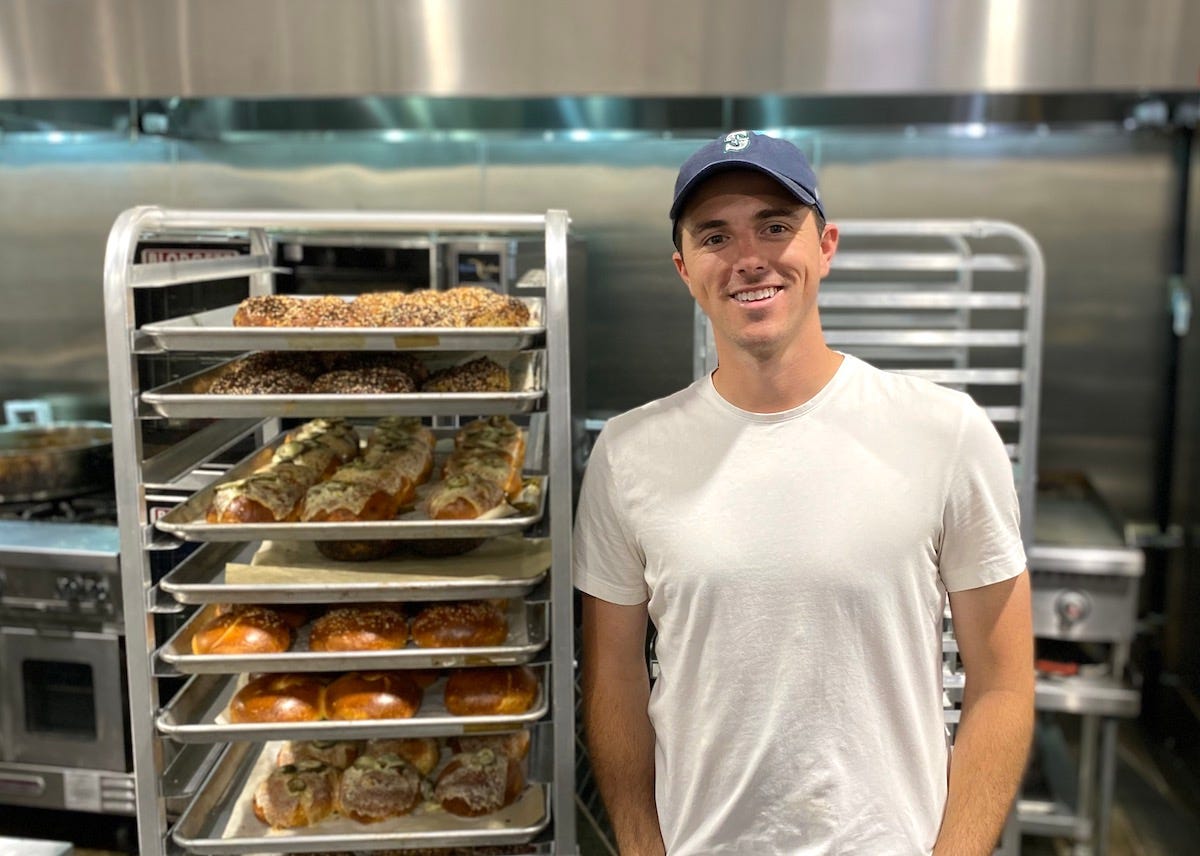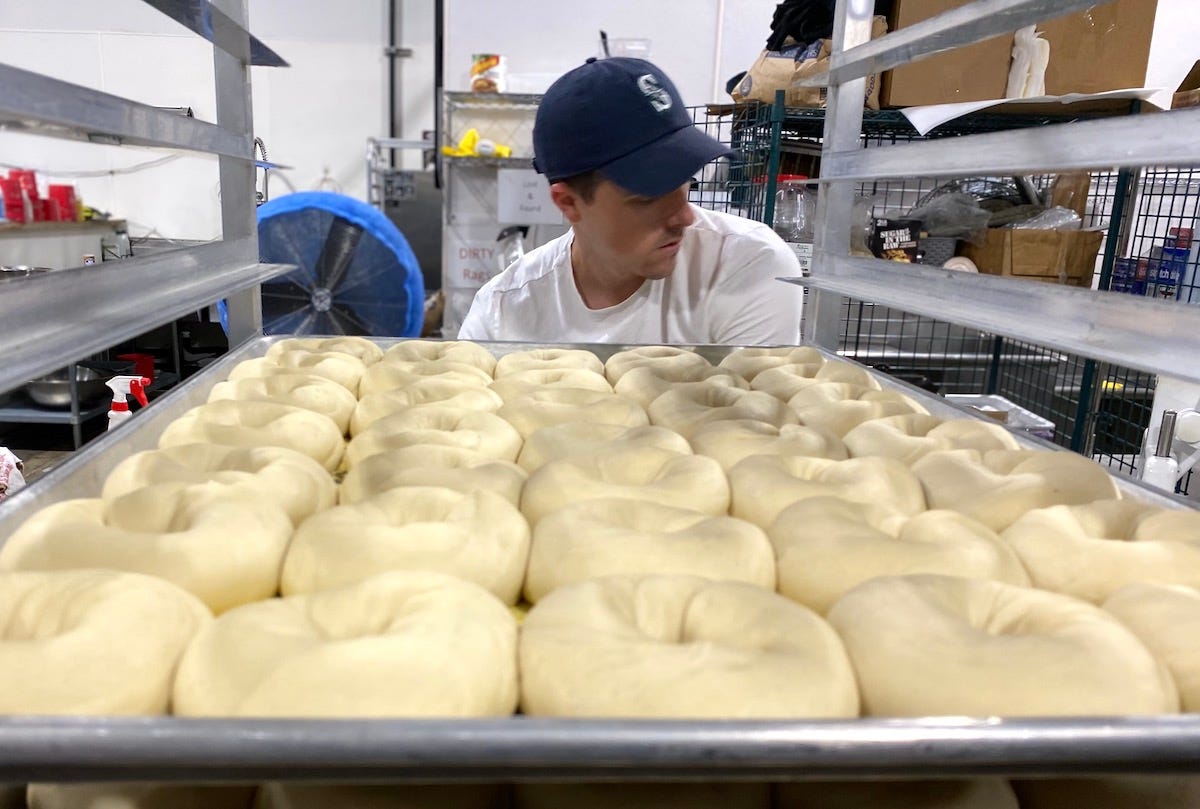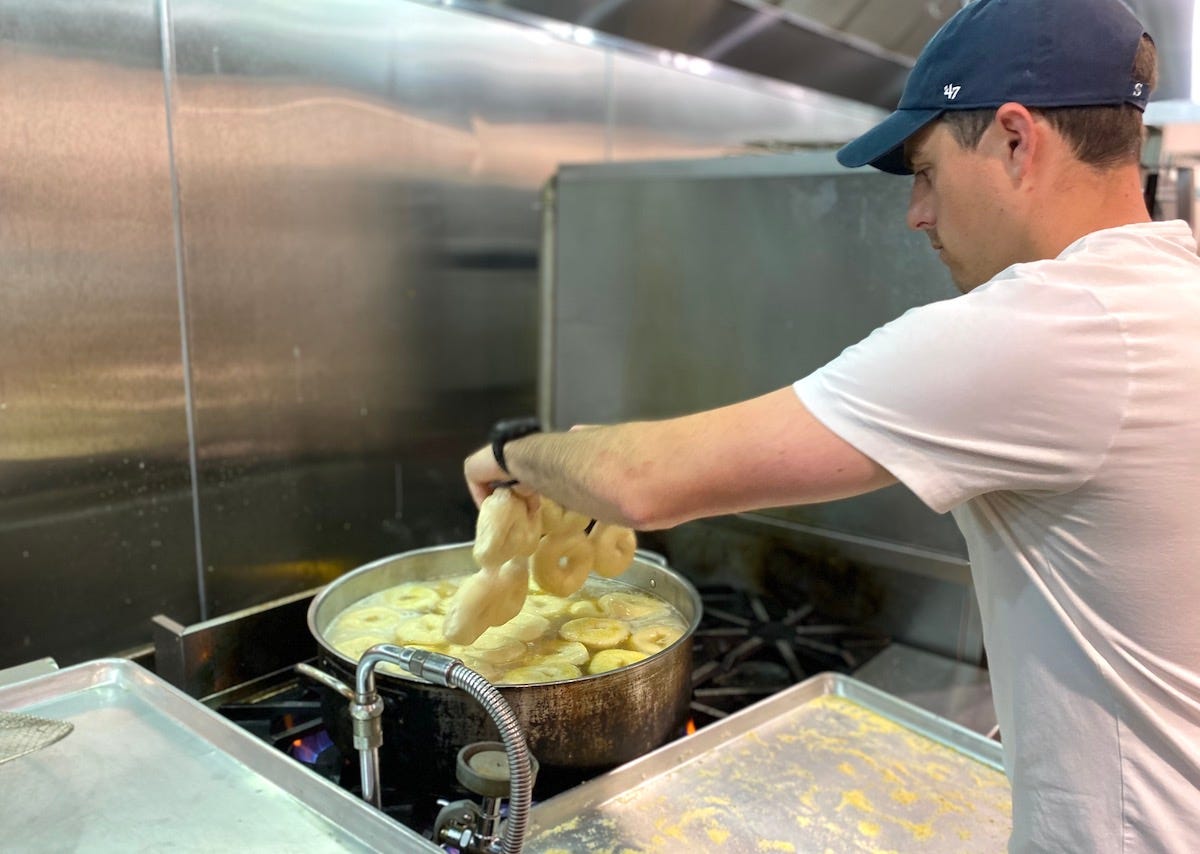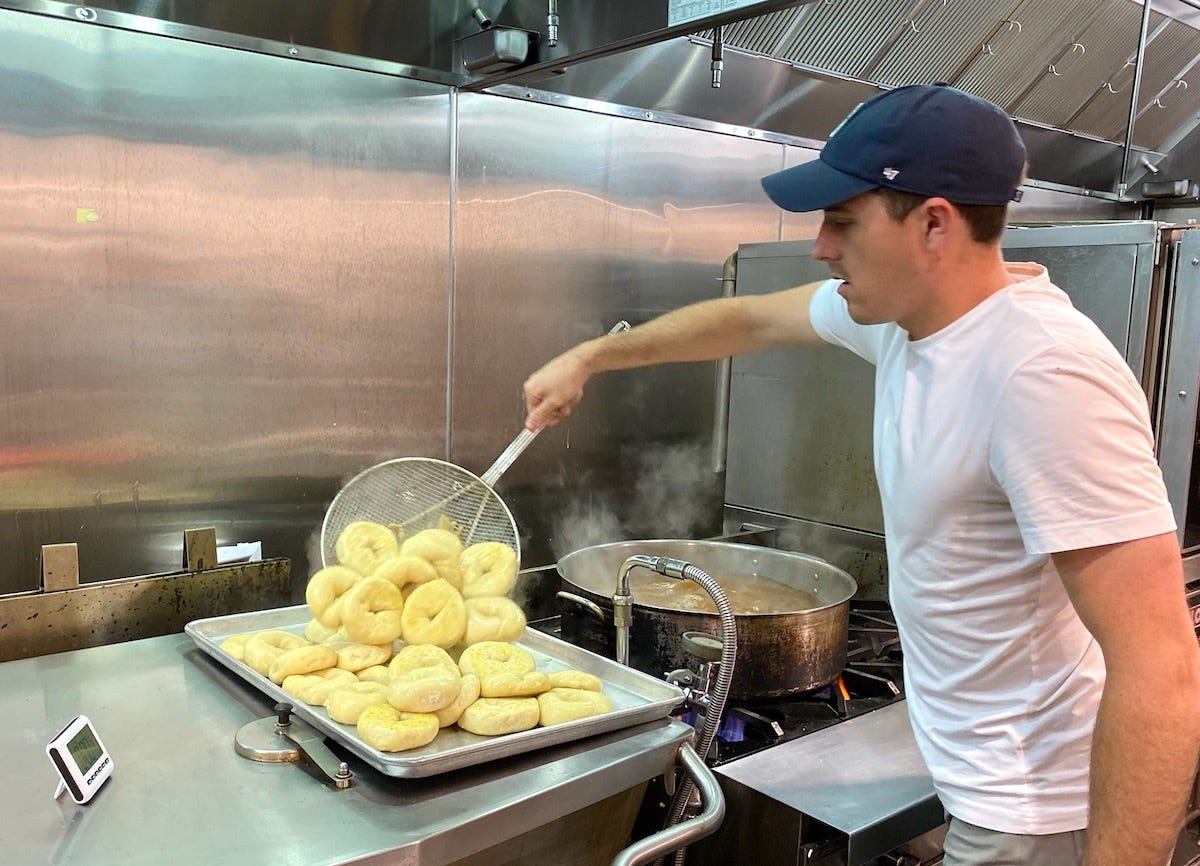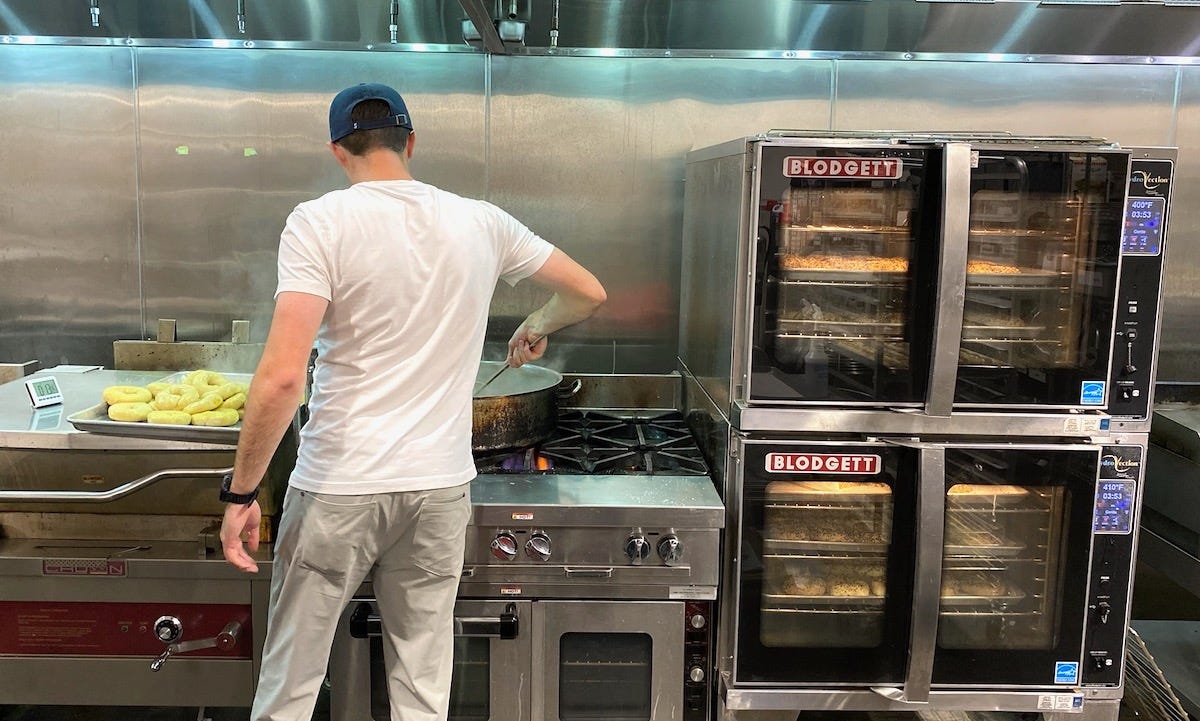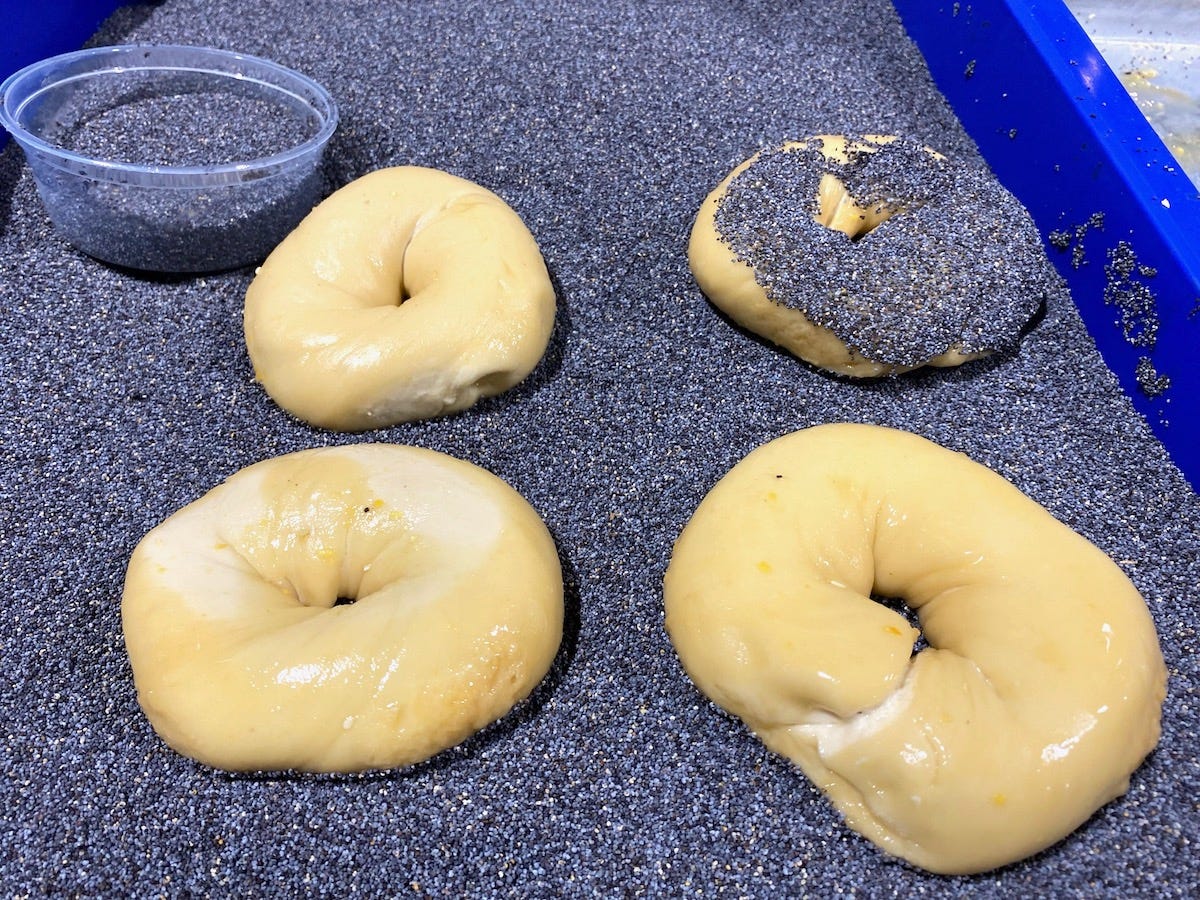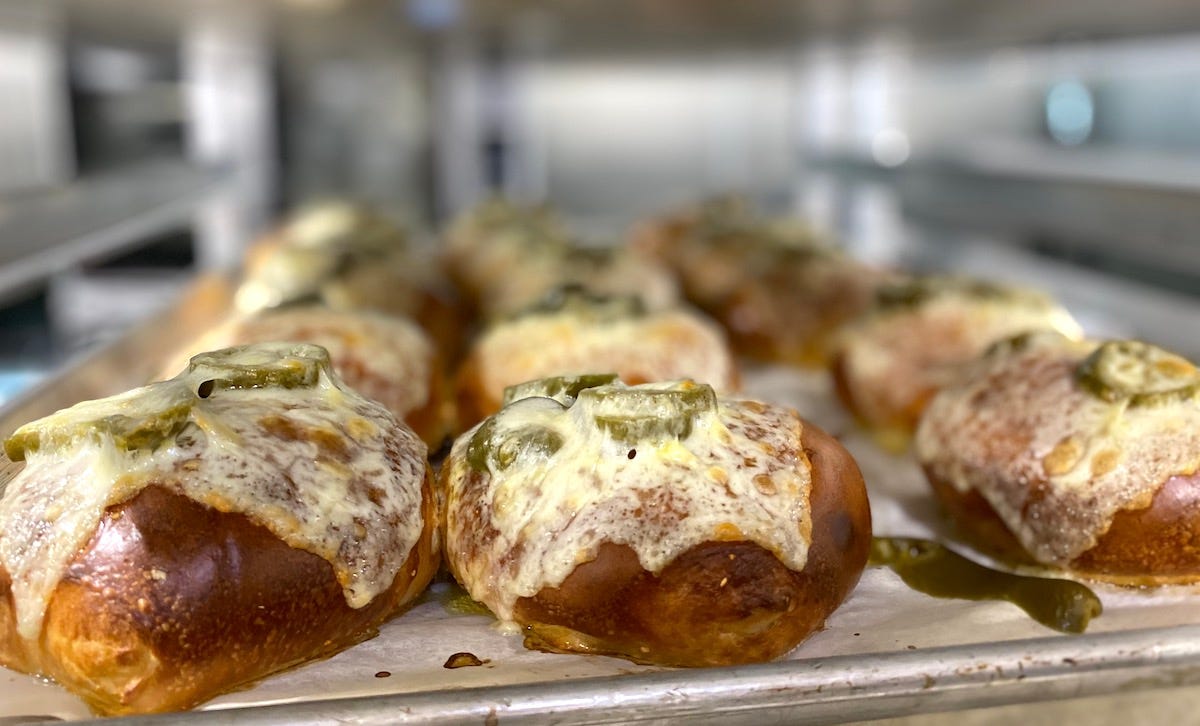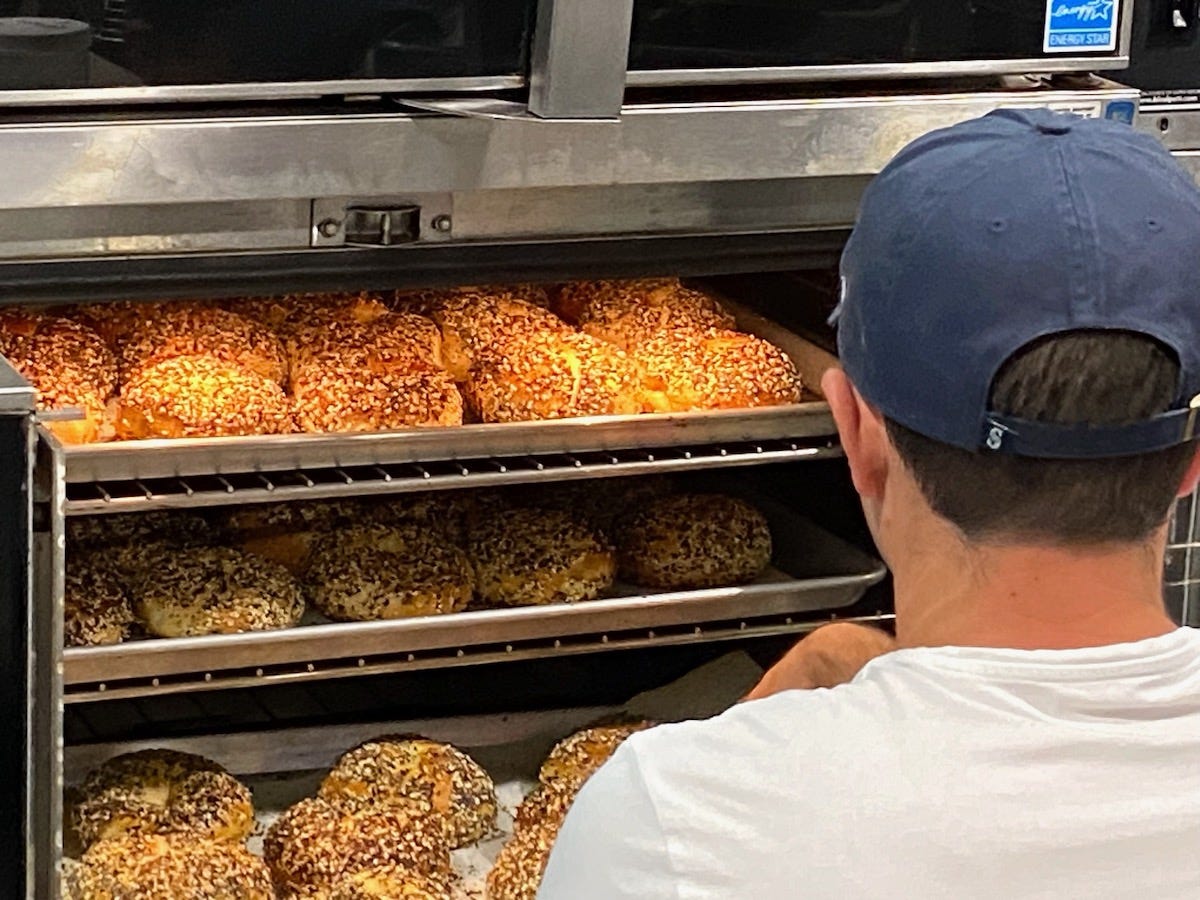Aaron's Bagels: From pandemic hobby to bona fide bagel business
“I think there's a lot of value in being, like, we make bagels. We make cream cheese. That's what we do. We do it well.”
Welcome to It’s A Shanda, one Northeastern Jew’s quest to find a decent bagel in Seattle (and beyond). Along with free bagel reviews every Sunday, we also offer bonus posts each Wednesday. If you’re already subscribed, I hope you’ll consider upgrading to a paid subscription! Thank you for reading.
When I imagined all of the magical places that my bagel newsletter might take me, standing under a train overpass on Marginal Way in Tukwila at 6:30 in the morning was not among them.
I’m groggily standing in front of a nondescript warehouse-style building that’s home to Artisan Community Kitchen. Given the early hour, the parking lot is fairly empty and the only sounds come from passing cars and the hum of morning traffic from nearby I-5.
It may not seem like it, but I’m about to learn that this is exactly the kind of magical place my bagel newsletter was always going to take me.
I’m greeted at the front door by Aaron Emas, who seems way too refreshed and happy this early in the day, especially considering I know he’s already been hard at work for an hour before I got there. He leads me inside the 7,900 square-foot communal industrial kitchen and we pass by stations that are currently home to all kinds of small food businesses, pop-ups, and farmer’s market stands. Soon enough, we arrive at the station where Emas will cut, mold, and eventually bake the latest batch of Aaron’s Bagels.
Today’s bake will turn one 50-pound bag of flour into around 240 bagels and I’ve been invited to see how that process happens.
Things have moved pretty quickly for Emas since discovering his passion for making bagels during the pandemic. Like so many others during that time, that process began with sourdough bread.
“It's kind of a COVID thing where everyone got a hobby. I don't know if it's like getting houseplants or making sourdough. I chose to bake bread,” said Emas. “So I was baking sourdough, and they were pretty good. They weren't the best ever, but fresh bread, how can you beat that?
“Then one day I saw this recipe. I forget where I saw it. Maybe it was the New York Times. It was for bagels. ‘Oh, that'd be awesome. I grew up Jewish. Love bagels. My grandparents bring back bagels from LA. That sounds awesome.’ And so I did it, and it came out amazing. First try. Alright, that's pretty cool. Let's try to make them a little better.
“Second try, and probably through No. 15, absolutely terrible.”
Much like a stand-up comedian or carpenter, Emas kept at it, learning from his mistakes. Every day between January and October 2022, he would make a batch. Each time, tweaking the recipe. Making small changes to the dough or playing with the oven temperature. Eventually, he got to the place where he felt comfortable offering his bagels for sale. It became apparent pretty quickly that this side hustle was going to require his full attention.
“I was doing this part-time, just selling bagels, doing deliveries,” said Emas. “And then I realized deliveries are a total pain and I don't have the time during the day to go deliver 20 boxes of bagels and then work 9 to 5. So I stopped doing that and started doing pop-ups, and we're doing markets and going from there.”
The universe nudged him along in early July when he was laid off from his day job. Now, his focus is fully on turning Aaron’s Bagels into a legitimate contender in the Seattle bagel scene. Recently being included in The Infatuation’s rankings of the region’s best bagels certainly helps.
Emas says his appreciation for the Jewish staple doesn’t come from specific experiences of eating life-changing bagels. Rather, they represented a special place in his memory of growing up and spending time with his grandparents.
“I grew up in Southern California, which isn't necessarily a hotspot for bagels, but my grandparents would…always go up to LA and bring back bagels,” said Emas. “I remember we'd get bagels from, I believe it was Katella Deli. They were bad bagels but I just loved the experience of, you walk in, it smells amazing.
“It's just like a sense of community. So I just always liked bagels, and I think I took bagels for granted. And then I came up here, there are not that many good bagels up in Seattle, which everyone says, so let's just try to make them.”
As for how he learned how to make them, Emas combined modern technology and classic techniques.
“I would watch on YouTube, it's old Jewish men making bagels,” said Emas. “That's how I learned how to roll bagels.”
Working in Artisan Community Kitchen offers small makers like Emas the space they need to prepare food. While they supply a lot of equipment and tools, he’s also put effort into buying basics for himself. One of his prized possessions is a Dutchess dough divider, a simple but very effective tool for separating the dough into appropriate bagel sizes. It didn’t come without some quirks, however.
“It was kind of a weird experience,” said Emas. “They're, like, four grand new, but I found this one on Facebook Marketplace, and it was in the back of this lady's storage unit in Arlington. I have to go back and go through all her old stuff. It's in the far back corner. I'm getting this thing out, and she's trying to upsell me on all this stuff. Like, ‘I'm moving to Montana. Do you want this? Do you want this?’ No, I really don't.
“She tried to upsell me on a mini-house. She's like, I also have a mini-house for sale. Do you want that? Usually, an upsell is a candy bar. Maybe some other equipment. A house? Are you kidding me?”
For a layman like myself, there was something very meditative to watch Emas prep the dough, shove it into the Dutchess, pull down the lever, remove the newly formed dough chunks, and then roll them into bagels. I could imagine there’s a true simple pleasure in getting up early each day to do this, though he says there are certainly pros and cons.
“The hardest part is just getting up in the morning,” he said. “Giving up on going out on Friday or Saturday night and going to a bar. Can't do that. But that's okay.
“It's also a workout. Especially if it's hot out. It does get a lot easier, but the bagel workout is really just forearms and shoulders. It does nothing for the legs and core. Absolutely nothing.”
One aspect of starting a bagel business in Seattle that came relatively easy was interjecting himself into the community. He’s found that most people in the bagel scene are friendly and very open to sharing and communication. When he reached out to Segal at Loxsmith to see about buying a mixer, that ended up turning into an impromptu internship where Emas worked there for two months to pay off the equipment sale.
“I learned a little bit more about making not just twelve bagels at the time, but 300, 400 bagels,” he said. “That was interesting.”
Emas says he’s also received lots of help and encouragement from his fellow new faces in the local bagel scene.
“Some of the people who helped me out a bunch are Howdy Bagel. Jake and Daniel. They're great,” he said. “Everyone was super helpful and want to help each other out. Really a supportive group.”
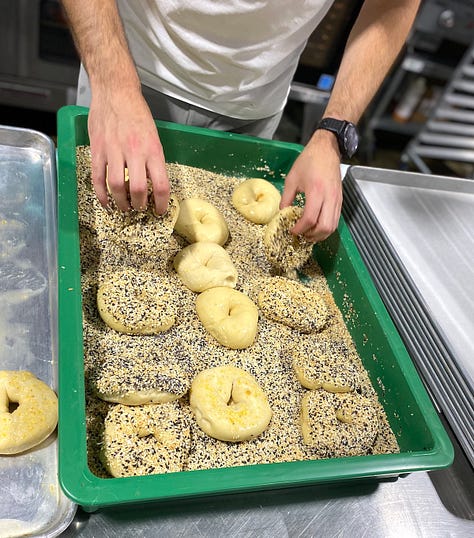
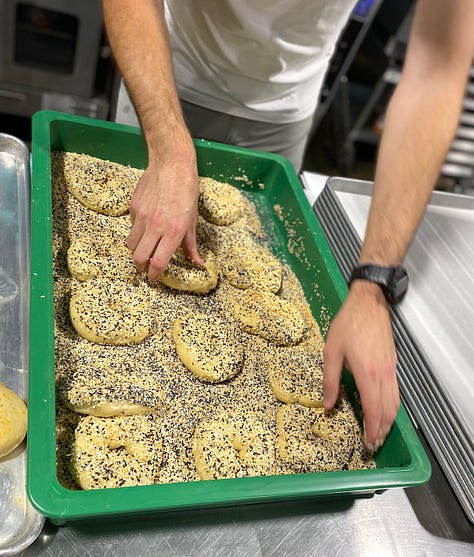
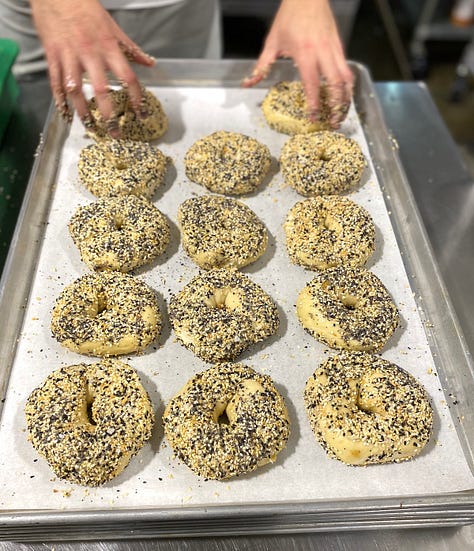
At the mention of Howdy Bagel, which was also born during the pandemic and has quickly asserted itself as Tacoma’s go-to bagel purveyor, I asked about the notion that the Seattle region is starting to develop its own style, separate from New York and Montreal, and how perhaps COVID-19 played a roll.
“I think this new style of bagel that's happening isn't localized in Seattle,” said Emas. “Another great example is Isaac's Bagels in Durham. But there's a bunch of them around the country that are doing this type.
“A Seattle-style bagel? I don't think it's localized enough to Seattle to be ‘This is Seattle.’ It's more of a post-COVID thing. I think there are really cool techniques that will probably form out of this that we just don't even know about yet.”
As for what makes an Aaron’s Bagels bagel, Emas scale-measures and hand-rolls all of his dough. He uses malt but shies away from syrups. He’s a strong proponent of using lye, which helps balance the PH of the water and create more consistent coloring and blisters.
Local ingredients are also very important to him. “I try to get every ingredient as local as possible,” alluding to his flour, salt, and other ingredients that come from Washington and Oregon.
Aaron’s Bagels features all of the classics, including plain, everything, and poppy seed, but there are also some special flavors in the form of sesame nori and jalapeno cheddar, the latter of which is a bestseller at farmer’s market appearances.
“I'm gonna make 100 of these on Saturday just because everyone's coming up and asking for them,” he said while prepping a batch of jalapeno cheddar bagels. “I do jalapeno cheddar differently than a lot of people. Usually, they will just put everything on the boiled dough and put it in the oven. I don't like doing that because I think the cheese gets burnt and I don't like that. I’ll take these [bagels that are] 80% done [and then put the cheese on]. The cheese will protect a lot of the crust from going too far.”
With a website, wholesale customers, and steady appearances at several farmer’s markets, not to mention the positive feedback he’s received so far, the immediate future looks bright for Aaron’s Bagels. Aaron’s wife Emily has a big hand in growing the business and he recently hired his first employee to help with bagel prep and farmer’s market sales.
While a retail location might be a ways off, and wholesale appears to be the cornerstone of the business for now, Seattle’s insatiable demand for good bagels offers a lot of opportunities for where things go from here. At this moment, Emas just wants to keep his focus on the humble bagel.
“I really like what Mt. Bagel is doing currently, with just bagels and cream cheese and doing the one thing and doing it probably best in Seattle, I'd assume,” said Emas. “I'm not a cook, I'm not a chef. I'm not going to pretend that I am. Sandwiches and being creative with different flavors and stuff, that’s not my strong suit. I just like making bagels.
“I think there's a lot of value in being, like, we make bagels. We make cream cheese. That's what we do. We do it well.”
Thanks for actually reading this far. Know someone in the Greater Seattle Area (or beyond) who would appreciate way-too-detailed reviews of local bagels? Please forward the link their way.


